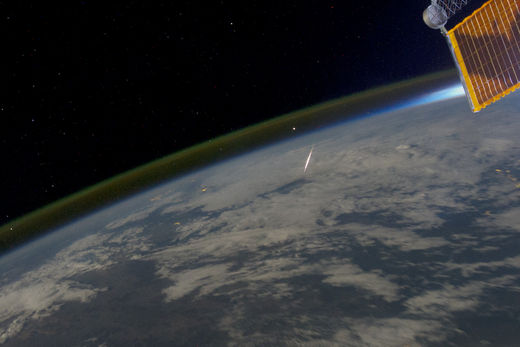
© NASAA meteor photographed from the ISS on 13 August 2011.
NASA officials announced Thursday that plans to alter the orbit of the International Space Station (IIS) would not move forward.
In a statement released to reporters, NASA officials noted that the space station's path will not put the massive orbiting module in the path of two large chunks of space debris.
"Additional tracking Wednesday night of both the Cosmos satellite debris and the Indian rocket body debris resulted in a high degree of confidence that neither object would pose any possibility of a conjunction with the International Space Station and a debris avoidance maneuver scheduled for Thursday morning was cancelled by the flight control team at Mission Control," NASA officials said in an update Thursday.
Mission Control says there is a high degree of confidence neither object will come too close to the space station. The worrisome debris contained fragments of an Indian rocket. NASA issued an alert late Thursday, warning that the space debris could pose a risk to the ISS. Three astronauts - NASA's Sunita Williams, Russia's Yuri Malenchenko and Japan's Akihiko Hoshide - are currently working aboard the space station.
The warning comes as NASA has closely tracked the paths of various pieces of space debris. NASA noted that space crew members routinely participate in emergency egress drills to maintain familiarity with the location of emergency equipment and hatches as well as the evacuation route to their Soyuz TMA-05M spacecraft. In cooperation with the mission control centers around the world, the crew works through response procedures as if there were an actual emergency requiring a rapid departure and tagged up with flight controllers afterward to review the results.
Space debris has received renewed interest as various nations continue to advance and enter low-earth orbit. A report released earlier this year by the National Research Council, called on NASA to begin examining more advanced means of monitoring and collecting orbiting junk that threatens active satellites and manned spacecraft.
"We're going to have a lot more [debris] collisions, and at an increasingly frequent rate," said Don Kessler, a former NASA scientist who chaired the committee that prepared the report.
Comment: 'Space debris' is, of course, cover for increased fireball flux due to Earth passing through higher concentrations of cometary debris. Like man-made global warming, chemtrails and HAARP, 'space debris' is the ready-(man-)made answer to something which man has absolutely no technological control over.
Reading between the lines of the above story, it appears that they were tracking two or more incoming meteors or cometary fragments (MoCFs), anticipated that a possible dodge would be required for the ISS, then canceled the operation once the MoCFs passed by. The ISS wasn't so lucky in June when it was hit by a smaller object:
International Space Station damaged by meteor

Comment: 'Space debris' is, of course, cover for increased fireball flux due to Earth passing through higher concentrations of cometary debris. Like man-made global warming, chemtrails and HAARP, 'space debris' is the ready-(man-)made answer to something which man has absolutely no technological control over.
Reading between the lines of the above story, it appears that they were tracking two or more incoming meteors or cometary fragments (MoCFs), anticipated that a possible dodge would be required for the ISS, then canceled the operation once the MoCFs passed by. The ISS wasn't so lucky in June when it was hit by a smaller object:
International Space Station damaged by meteor